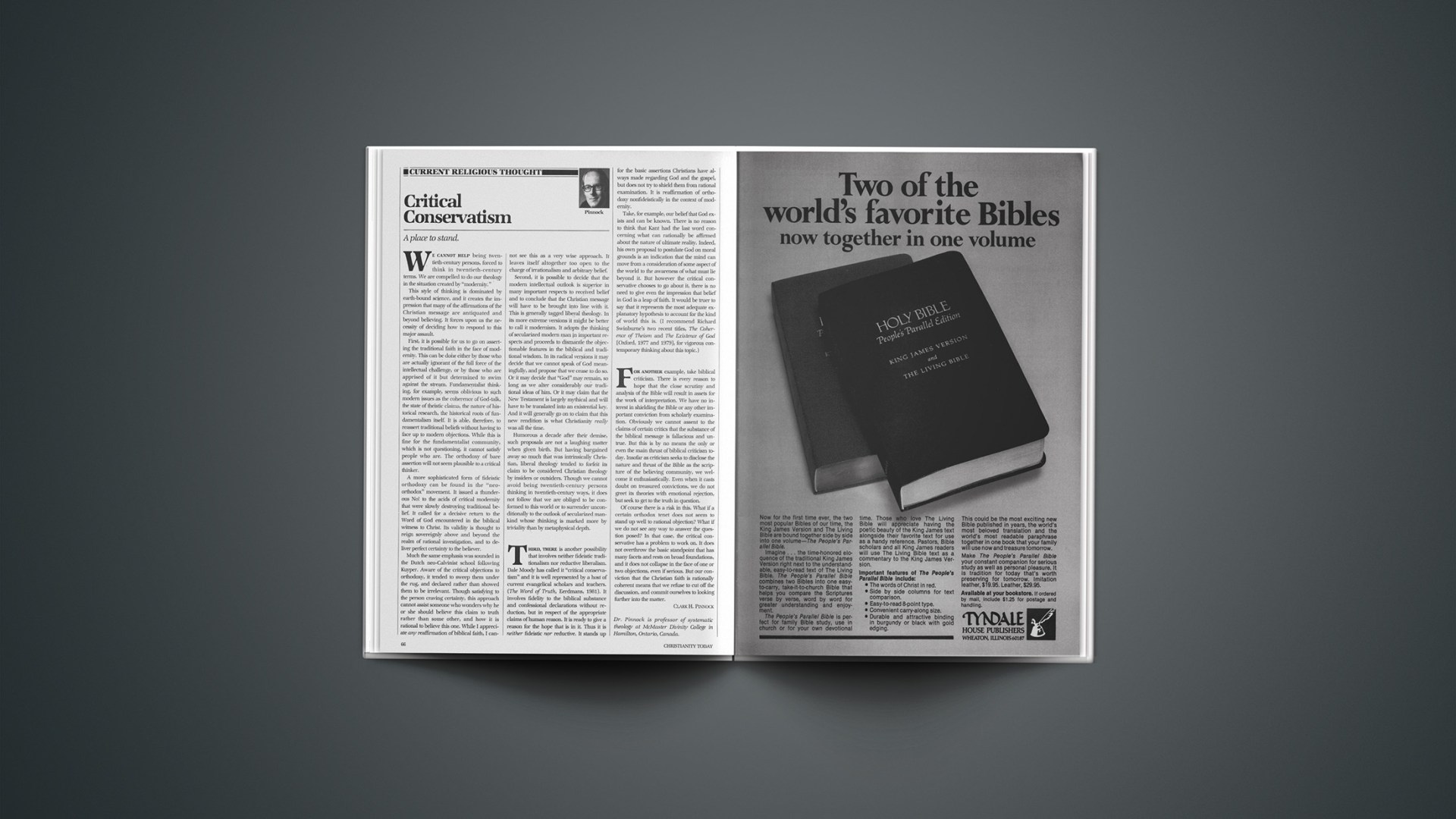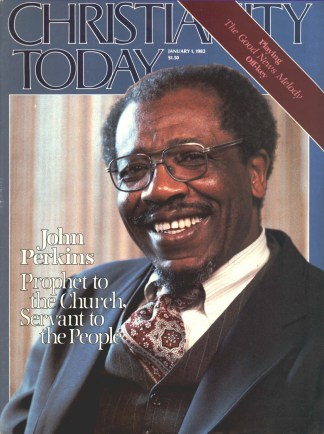We cannot help being twentieth-century persons, forced to think in twentieth-century terms. We are compelled to do our theology in the situation created by “modernity.”
This style of thinking is dominated by earth-bound science, and it creates the impression that many of the affirmations of the Christian message are antiquated and beyond believing. It forces upon us the necessity of deciding how to respond to this major assault.
First, it is possible for us to go on asserting the traditional faith in the face of modernity. This can be done either by those who are actually ignorant of the full force of the intellectual challenge, or by those who are apprised of it but determined to swim against the stream. Fundamentalist thinking, for example, seems oblivious to such modern issues as the coherence of God-talk, the state of theistic claims, the nature of historical research, the historical roots of fundamentalism itself. It is able, therefore, to reassert traditional beliefs without having to face up to modern objections. While this is fine for the fundamentalist community, which is not questioning, it cannot satisfy people who are. The orthodoxy of bare assertion will not seem plausible to a critical thinker.
A more sophisticated form of fideistic orthodoxy can be found in the “neo-orthodox” movement. It issued a thunderous No! to the acids of critical modernity that were slowly destroying traditional belief. It called for a decisive return to the Word of God encountered in the biblical witness to Christ. Its validity is thought to reign sovereignly above and beyond the realm of rational investigation, and to deliver perfect certainty to the believer.
Much the same emphasis was sounded in the Dutch neo-Calvinist school following Kuyper. Aware of the critical objections to orthodoxy, it tended to sweep them under the rug, and declared rather than showed them to be irrelevant. Though satisfying to the person craving certainty, this approach cannot assist someone who wonders why he or she should believe this claim to truth rather than some other, and how it is rational to believe this one. While I appreciate any reaffirmation of biblical faith, I cannot see this as a very wise approach. It leaves itself altogether too open to the charge of irrationalism and arbitrary belief.
Second, it is possible to decide that the modern intellectual outlook is superior in many important respects to received belief and to conclude that the Christian message will have to be brought into line with it. This is generally tagged liberal theology. In its more extreme versions it might be better to call it modernism. It adopts the thinking of secularized modern man in important respects and proceeds to dismantle the objectionable features in the biblical and traditional wisdom. In its radical versions it may decide that we cannot speak of God meaningfully, and propose that we cease to do so. Or it may decide that “God” may remain, so long as we alter considerably our traditional ideas of him. Or it may claim that the New Testament is largely mythical and will have to be translated into an existential key. And it will generally go on to claim that this new rendition is what Christianity really was all the time.
Humorous a decade after their demise, such proposals are not a laughing matter when given birth. But having bargained away so much that was intrinsically Christian, liberal theology tended to forfeit its claim to be considered Christian theology by insiders or outsiders. Though we cannot avoid being twentieth-century persons thinking in twentieth-century ways, it does not follow that we are obliged to be conformed to this world or to surrender unconditionally to the outlook of secularized mankind whose thinking is marked more by triviality than by metaphysical depth.
Third, there is another possibility that involves neither fideistic traditionalism nor reductive liberalism. Dale Moody has called it “critical conservatism” and it is well represented by a host of current evangelical scholars and teachers. (The Word of Truth, Eerdmans, 1981). It involves fidelity to the biblical substance and confessional declarations without reduction, but in respect of the appropriate claims of human reason. It is ready to give a reason for the hope that is in it. Thus it is neither fideistic nor reductive. It stands up for the basic assertions Christians have always made regarding God and the gospel, but does not try to shield them from rational examination. It is reaffirmation of orthodoxy nonfideistically in the context of modernity.
Take, for example, our belief that God exists and can be known. There is no reason to think that Kant had the last word concerning what can rationally be affirmed about the nature of ultimate reality. Indeed, his own proposal to postulate God on moral grounds is an indication that the mind can move from a consideration of some aspect of the world to the awareness of what must lie beyond it. But however the critical conservative chooses to go about it, there is no need to give even the impression that belief in God is a leap of faith. It would be truer to say that it represents the most adequate explanatory hypothesis to account for the kind of world this is. (I recommend Richard Swinburne’s two recent titles, The Coherence of Theism and The Existence of God [Oxford, 1977 and 1979], for vigorous contemporary thinking about this topic.)
For another example, take biblical criticism. There is every reason to hope that the close scrutiny and analysis of the Bible will result in assets for the work of interpretation. We have no interest in shielding the Bible or any other important conviction from scholarly examination. Obviously we cannot assent to the claims of certain critics that the substance of the biblical message is fallacious and untrue. But this is by no means the only or even the main thrust of biblical criticism today. Insofar as criticism seeks to disclose the nature and thrust of the Bible as the scripture of the believing community, we welcome it enthusiastically. Even when it casts doubt on treasured convictions, we do not greet its theories with emotional rejection, but seek to get to the truth in question.
Of course there is a risk in this. What if a certain orthodox tenet does not seem to stand up well to rational objection? What if we do not see any way to answer the question posed? In that case, the critical conservative has a problem to work on. It does not overthrow the basic standpoint that has many facets and rests on broad foundations, and it does not collapse in the face of one or two objections, even if serious. But our conviction that the Christian faith is rationally coherent means that we refuse to cut off the discussion, and commit ourselves to looking further into the matter.
Dr. Pinnock is professor of systematic theology at McMaster Divinity College in Hamilton, Ontario, Canada.



